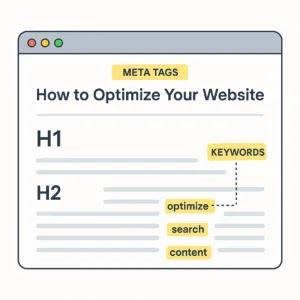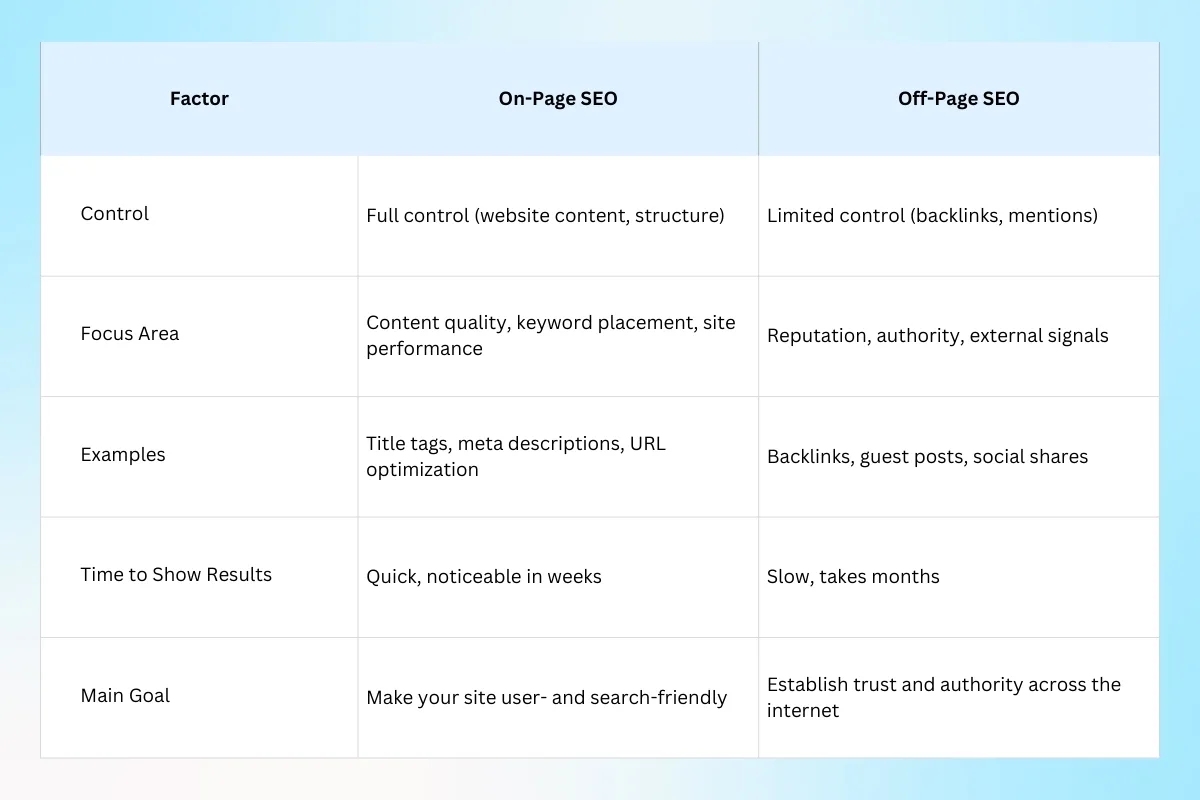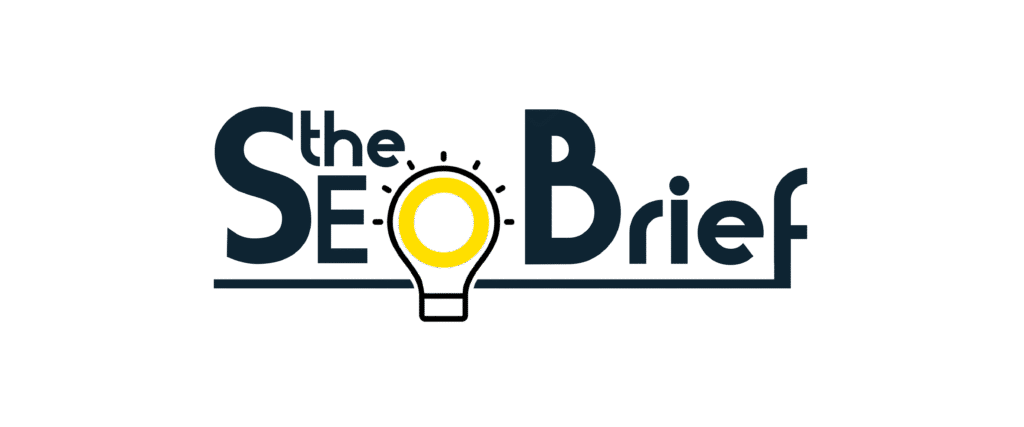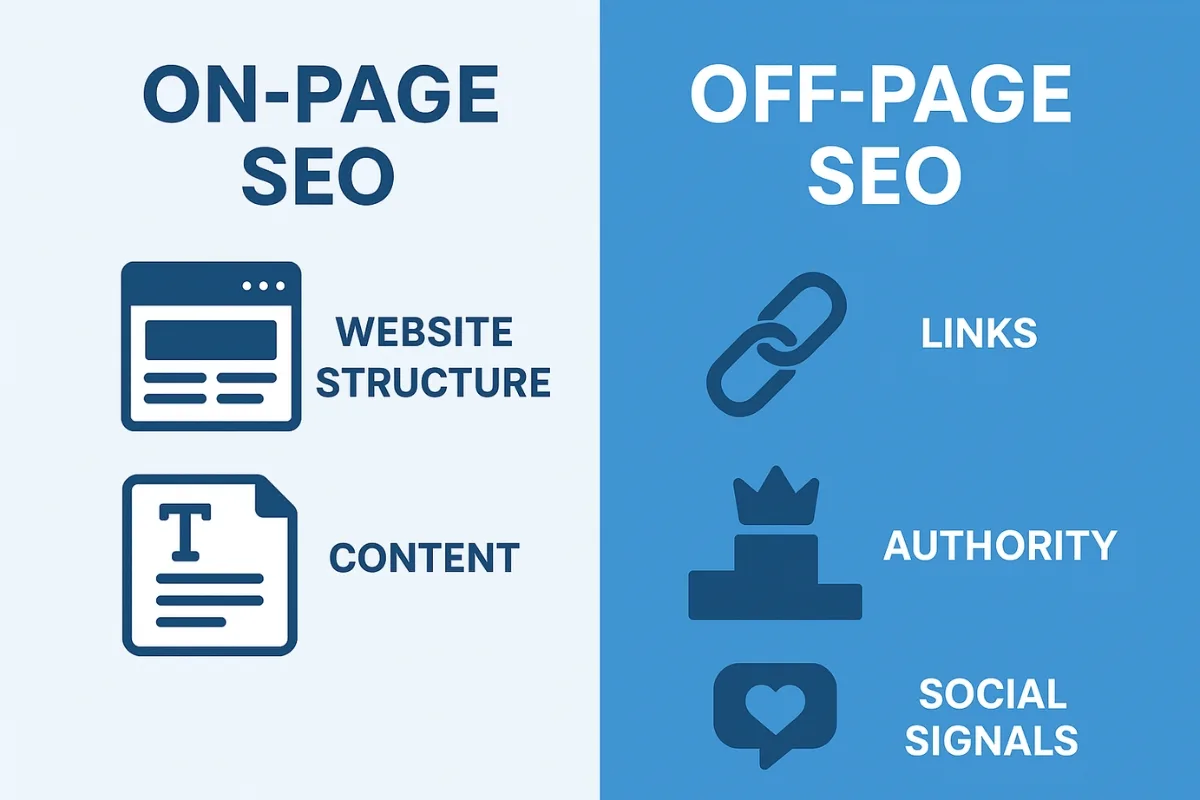On-Page SEO vs Off-Page SEO: What You Need to Know as a Beginner
Confused about on-page SEO vs off-page SEO? This beginner-friendly guide explains the key differences, techniques, and tips to help your website rank higher on Google.
Table of Contents
As you start in the field of digital marketing, you hear everyone tossing around the terms on-page SEO and off-page SEO. But what are they really doing, and how do they affect your website’s ranking on Google?
If you’re a beginner looking for a simple and straightforward explanation, you’ve come to the right place.
In this blog, we’ll break down the difference between on-page SEO and off-page SEO, discuss why both are vital, and present real-world tips to help you get started.
What Is On-Page SEO?
Common Features of On-Page SEO:
On-page SEO is anything that you can directly control on your site in order to make it more search engine–friendly. Think of it as the foundation of your house—if it’s strong, everything built on it will be stable.
Content Quality – Develop original, user-focused content that answers search queries.
Keyword Optimization – Place your focus keyword and sub-keywords naturally in titles, headings, and body text.
Meta Tags – Write SEO-friendly meta titles and descriptions to boost click-through rates.
URL Structure – Create short, clean, and keyword-rich URLs.
Internal Linking – Link to other relevant pages on your site to improve navigation and share link equity.
Mobile Friendliness – Ensure your site looks and works well on mobile devices.
Page Speed – Optimize images and code for faster loading.
✅ In short: On-page SEO is simply making your site’s content and structure easy for both search engines and users to understand.

What Is Off-Page SEO?
Off-page SEO is all about building your website’s credibility and authority outside your own pages. Think of it as your website’s popularity score. The more trusted and talked about your site is across the internet, the better your chances of ranking high.
Important Off-Page SEO Tactics:
Backlinks – Get links from credible websites pointing to your site.
Social Media Signals – Share content on social media to increase visibility and engagement.
Guest Posting – Write articles for other websites with backlinks to your own.
Brand Mentions – Gain recognition when websites or influencers mention your brand (even without a link).
Local SEO Citations – Add your business to directories like Google Business Profile, Yelp, and other local listings.
✅ In short: Off-page SEO is all about building trust, authority, and popularity across the web.

Key Differences Between On-Page SEO and Off-Page SEO
Here’s a quick comparison table to simplify:

Why You Need Both On-Page and Off-Page SEO
Think of on-page SEO as your resume and off-page SEO as your references. You need both to get hired.
Without on-page SEO → your site won’t be search engine-friendly.
Without off-page SEO → search engines won’t trust your site.
👉 To rank higher on Google, you need the right balance of both strategies.
Beginner Tips to Get Started
On-Page SEO Tips
Use a single focus keyword and a few sub-keywords naturally.
Organize content with H1, H2, H3 headings.
Add at least one internal link to another page on your site.
Compress images before uploading for faster speed.
Off-Page SEO Strategies
Start by commenting on blogs within your niche.
Share your content on LinkedIn, Twitter, and Instagram.
Ask happy customers or clients to leave Google reviews.
Build connections with other bloggers in your niche.
Pitfalls to Avoid as a Beginner
❌ Keyword Stuffing – Don’t overuse keywords; it sounds unnatural.
❌ Buying Backlinks – Low-quality backlinks can trigger Google penalties.
❌ Ignoring Mobile Users – Most traffic now comes from mobile.
❌ Not Using Internal Links – Weakens your site’s SEO strength.
Conclusion
The debate of on-page SEO vs off-page SEO isn’t about choosing one over the other. Instead, they work together.
On-page SEO optimises your site’s content and structure.
Off-page SEO spreads trust, authority, and visibility.
👉 If you’re starting, focus first on on-page SEO since it’s completely under your control. Once your site is optimized, move into off-page strategies like link building and brand mentions.
Remember: SEO is not a sprint but a marathon. With steady efforts in both areas, your site will rise in rankings and attract the right audience.

